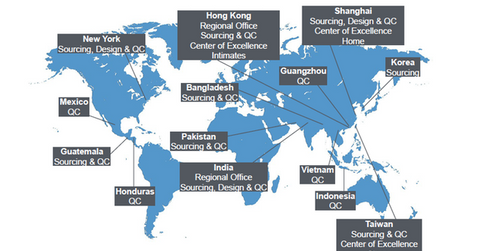Why Has JCPenney Been Restoring Its Private Brands?
The year 2014 marked 100 years of JCPenney’s (JCP) first private brand Marathon Hats. One of the major focus points of JCPenney’s turnaround strategy was to bring back its private brands.
Oct. 15 2015, Updated 9:04 p.m. ET

Private brands
The year 2014 marked 100 years of JCPenney’s (JCP) first private brand Marathon Hats. One of the major focus points of JCPenney’s turnaround strategy was to bring back its private brands. JCPenney derives ~50% of its revenue from private brands while the remaining is generated from the sale of national brands like Nike (NKE) and Levi’s.
Rationale behind having private brands
JCPenney’s popular private brands include a.n.a, Worthington, St. John’s Bay, The Original Arizona Jean Company, Ambrielle, Stafford, JF J. Ferrar, and Xersion. The company started private brands many years back as certain vendors denied it access to particular brands. Private brands provide the company greater flexibility in terms of sourcing and pricing. JCPenney’s private brands also carry higher gross margins than national brands as the company has control over pricing, the timing of the markdowns, and the distribution of the merchandise. According to Siiri Dougherty, senior vice president, women’s apparel, JCPenney’s private brands generate gross profit that is 300–400 basis points more than their national brand counterparts.
The company builds brands based on consumers’ preferences. For instance, Worthington for career wear, or Stafford for men’s tailored clothing. JCPenney assigns design teams by brand. At the company’s 2014 analyst day event, then CEO Mike Ullman stated that the company had hired about 200 designers over the last five or seven years.
Private brands create a loyal customer base as they are exclusively available at JCPenney’s stores. The above reasons made Mike Ullman, who returned to JCPenney in April 2013, refocus on these brands as part of the company’s turnaround strategy.
JCPenney’s rival Kohl’s (KSS) also sells private brands like Apt. 9, Croft & Barrow, and Jumping Beans. Alfani, Epic Threads, Hudson Park, and Thalia Sodi are some of the private brands offered by Macy’s (M). Nordstrom’s (JWN) private brands include Caslon, Zella, and Halogen.
JCPenney, Kohl’s, Nordstrom, and Macy’s account for 0.7% of the portfolio holdings of the iShares Russell Mid-Cap ETF (IWR).
Strategic sourcing
The company’s product development team works in collaboration with its merchants and suppliers. JCPenney has been importing products from across the world since 1959. The company’s sourcing organization has eight offices globally aside from its office in Dallas. The offices are in Shanghai, Hong Kong, Korea, Bangladesh, Guatemala, Pakistan, India, and Taiwan. The company ensures the quality of the products through numerous inspections and product tests.
